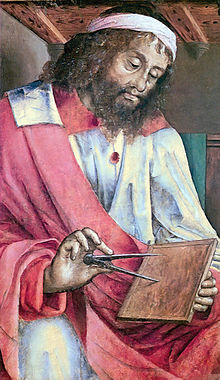Get Today in Masonic History into your Inbox. Sign up today for one of our email lists!
Need an article for your Trestleboard/Newsletter see our Use Policy
Euclid

Today in Masonic History we discuss Euclid.
Euclid is often referred to as "the father of geometry."
There is little known about the life of Euclid. He is believed to have been born sometime around the mid-4th century B.C.E. The only reference available on this comes form peers referencing him or accounts by those around him. This is considered odd by most historians since people who lived in time periods before, after and at the same time as Euclid have plenty of reference material written about them. This lack of information about Euclid has led some to speculate he was actually a group of mathematicians and the collection of theories provided by him, were actually provided by the group.
The only historical references to Euclid as an individual were not written until 4th and 5th centuries A.D. Even Archimedes referred to him as "ο στοιχϵιώτης" (the author of Elements).
Further confusion occurs do to the fact there was a second Euclid at the time known as Euclid of Megara who was a follower of Socrates and was present at Socrates death. The Euclid of Geometry fame was known as Euclid of Alexandria.
Regardless of whether Euclid was an actual person or a group of mathematicians, Elements which was written and attributed to Euclid, is one of the most important books on mathematics, specifically Geometry. It was used for nearly 23 centuries to teach Geometry. It started falling out of favor in the 19th century when what is referred to as non-Euclidean geometry started to emerge.
For Freemasonry Geometry is a critical part of our symbolism. Euclid himself was written into the history of Freemasonry in the 14th Century Regius Poem which starts off talking about how Euclid trained the good families in Egypt in Geometry calling it masonry. In the poem, parents are worried their children will not be able to find work and they will not be able to support their children. They then ask scholars to teach their children. In the poem Euclid emerges as the greatest of the pupils and then teaches others in the ways of Geometry.
Euclid is believed to have passed away in the mid-3rd century B.C.E.
This article provided by Brother Eric C. Steele.
| S | M | T | W | T | F | S |
| 1 | 2 | 3 | 4 | 5 | 6 | 7 |
| 8 | 9 | 10 | 11 | 12 | 13 | 14 |
| 15 | 16 | 17 | 18 | 19 | 20 | 21 |
| 22 | 23 | 24 | 25 | 26 | 27 | 28 |
| 29 | 30 | 31 | ||||
Other Events Today
Edward George Earle Lytton Bulwer-Lytton, 1st Baron Lytton Passes Away
Alexander Lindsay, 6th Earl of Balcarres is Born
Stratton Duluth Brooks Passes Away
Albert Alonzo "Doc" Ames is Born

